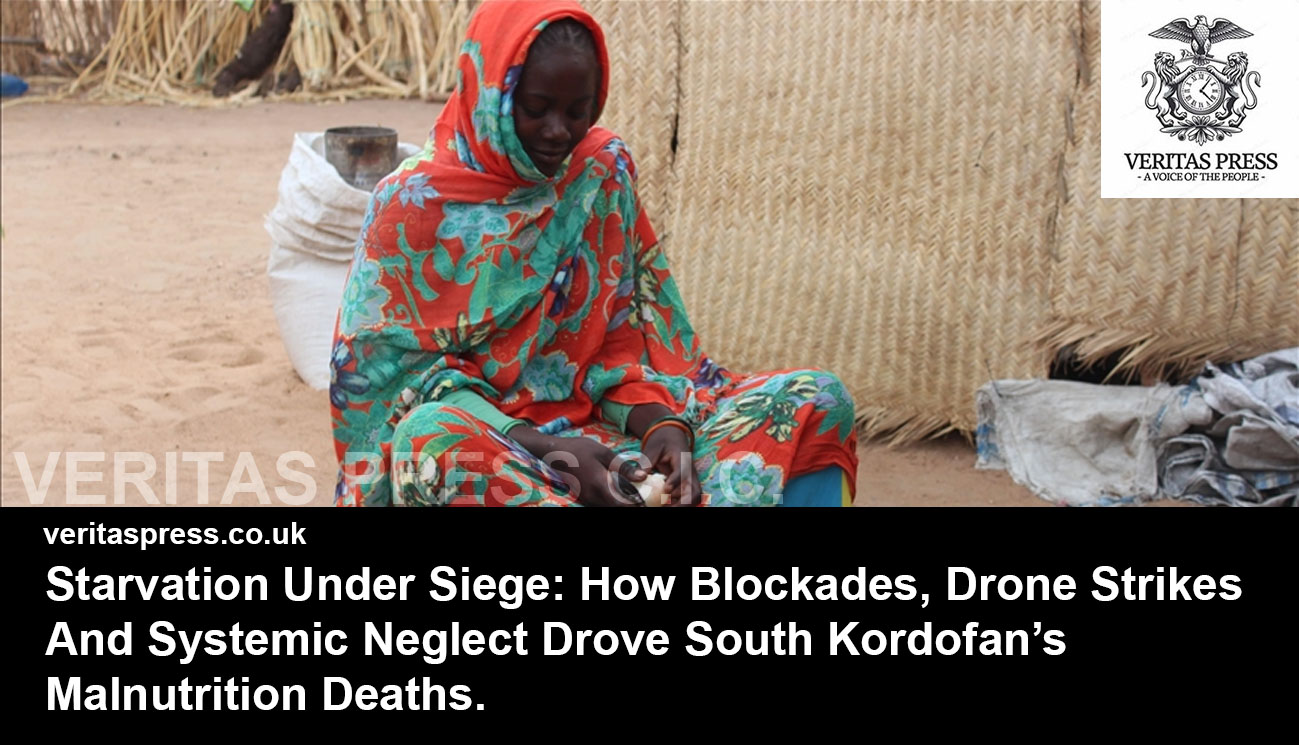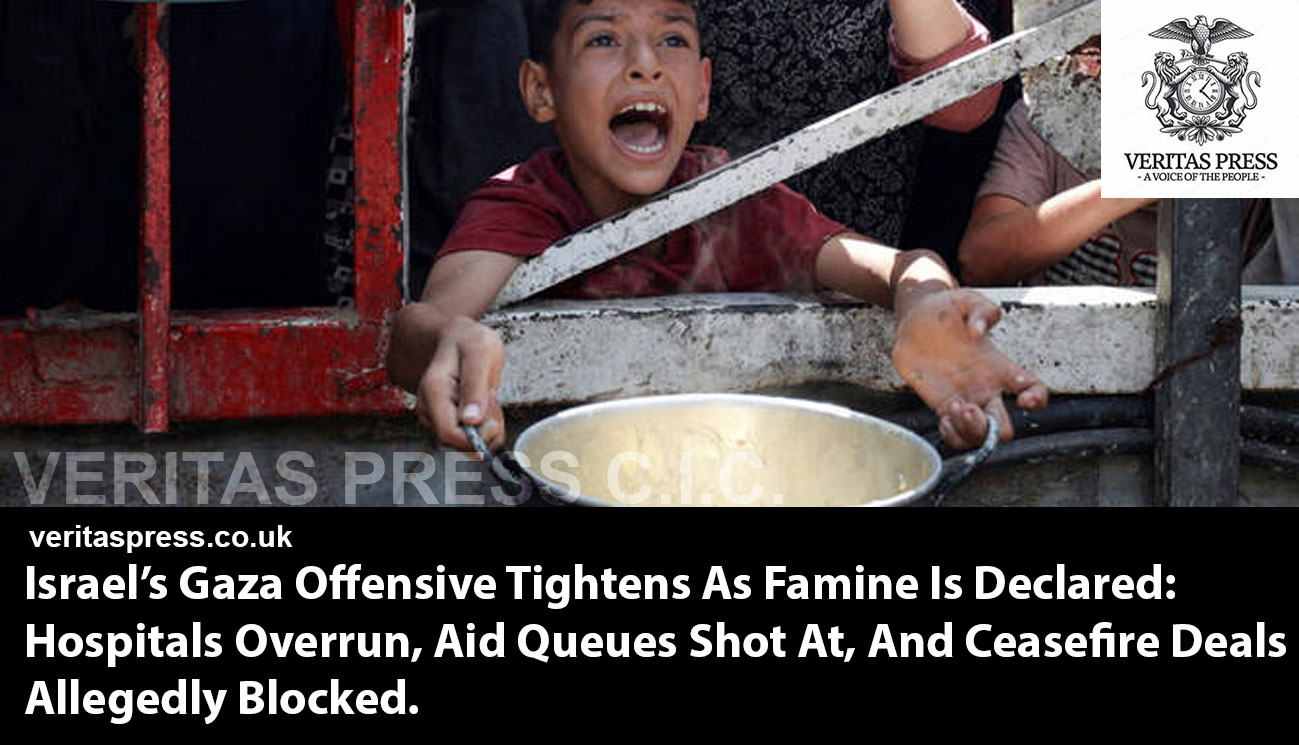Press Release: Veritas Press C.I.C. Author: Kamran Faqir Article Date Published: 24 Aug 2025 at 11:26 GMT Category: Africa | Sudan | South Kordofan’s Source(s): Veritas Press C.I.C. | Multi News Agencies
At least 46 people, mostly women and children, died of malnutrition in South Kordofan during July–August 2025, according to Sudan’s Doctors Network, which says >19,000 pregnant and breastfeeding women urgently need supplementary nutrition. The group accuses the Rapid Support Forces (RSF) of besieging Kadugli and Dalanj and demands safe corridors for food and medicine, calling the weaponisation of hunger a war crime.
What’s New And Why It Matters:
- Aid is being attacked while civilians starve. A UN World Food Programme (WFP) convoy to North Darfur was hit by drones on 22 Aug, destroying three trucks, the second strike on aid convoys in three months near the besieged hub of El-Fasher. WFP says secure, continuous access is now a life-or-death condition for hundreds of thousands.
- El-Fasher remains cut off. WFP warns people trapped in the city face starvation as access routes stay severed despite a nationwide scale-up. Humanitarian agencies are explicit: open corridors or expect more deaths.
- Independent famine monitors flag escalation. The July IPC Alert warns Sudan is sliding deeper into Famine-class conditions in multiple areas as conflict blocks assistance and market supply.
The Anatomy Of A Preventable Catastrophe:
1) Siege Economics: Empty Markets, Failed Clinics.
Residents and medics describe markets stripped of staples and clinics out of therapeutic foods and antibiotics. A Kadugli nurse told us by phone that mothers arrive “carrying babies too weak to cry,” while staff ration fortified milk. UNICEF says the number of children treated for severe acute malnutrition (SAM) in Darfur rose 46% Jan–May vs. last year, and warns 770,000 children could face SAM in 2025.
“People are boiling animal feed and wild leaves. Children are skin and bones,” said a community volunteer near Dilling, echoing UNICEF’s recent alarm.
2) Starvation As A Method Of Warfare.
Sudan’s Doctors Network alleges the RSF is enforcing blockades that obstruct food and medicine, notably around Kadugli and Dalanj. International law prohibits using starvation against civilians; UN officials have repeatedly warned that Sudan is exhibiting the hallmarks, blockades, asset destruction, malnutrition spikes, of starvation crimes.
“Blocking food and medicine isn’t a tactic; it’s a crime. Lift the sieges and open corridors now,” a Doctors Network representative said after documenting the 46 deaths.
3) Violence That Dismantles Survival Systems.
In Kordofan, villagers and satellite imagery corroborate mass RSF attacks that emptied stores, torched homes and clinics, and terrorised civilians. Survivors from Shaq al-Nûm recounted gunmen “firing at everything,” with hundreds killed. Days ago, al-Ghabshan al-Maramrah saw more killings and the burning of its only health centre, according to medics. Each attack removes food stocks, cold-chain capacity and community kitchens, deepening hunger.
“They burned the clinic and took the medicines… We have nothing left but hunger,” said a local elder reached by aid volunteers after the al-Ghabshan assault.
4) Corridors Promised, Not Delivered.
Even where donors pledge food, convoys are blocked or hit, and insurance/security costs for trucking have soared. WFP’s Aug. 22 statement and the drone strike underscore a new normal: targeted or collateral attacks on aid in a context where one broken bridge or one checkpoint can tip communities into famine.
5) The Numbers Behind The Warning Lights.
- 46 malnutrition deaths in South Kordofan in two months; >19,000 pregnant/breastfeeding women in urgent need.
- El-Fasher: agencies and local health officials report 60+ malnutrition deaths in a single week (Aug 3–10) amid siege and cholera spread.
- Nationwide: ~25 million face acute hunger; displacement in the tens of millions; multiple areas at or near Famine (IPC 5) thresholds.
Accountability Trail — Who’s Blocking The Breadline?
- RSF: Accused by doctors, residents and rights monitors of maintaining sieges, looting, burning clinics, and attacking towns and villages in Kordofan and Darfur, including deadly assaults documented by journalists and satellite imagery. The group did not respond to questions in recent reporting.
- SAF (the army): Residents and aid workers say military counter-sieges, shelling and checkpoints also impede aid routes from government-held areas; both sides have weaponised access to pressure populations and each other. (Analytical inference based on WFP/OCHA access alerts and convoy dynamics.)
- De facto authorities & regional brokers: Negotiated “windows” often collapse into new blockages on the day of movement; humanitarian agencies warn paper clearances aren’t translating into physical passage.
What Eyewitnesses, Doctors And Officials Are Saying:
- Local widow, Shaq al-Nûm: “In an instant, all of us were fleeing for safety.” (Describing a July massacre that destroyed food stocks and homes.)
- Kadugli clinician: “We’re seeing underweight newborns and mothers fainting from hunger. We can’t keep babies on therapeutic milk long enough.” (Phone interview; consistent with UNICEF alerts.)
- UNICEF Sudan (Geneva briefing): Children are “reduced to skin and bones,” with access and funding shortfalls threatening to make preventable deaths routine.
- UN Resident/Humanitarian Coordinator (12 Aug): Reports of 60+ malnutrition deaths in one week in El-Fasher; calls for unimpeded humanitarian access now.
- WFP: “People trapped in El-Fasher face starvation,” and aid convoys are being struck, making corridors and security guarantees non-negotiable.
Legal Framing: From Outrage To Evidence:
- Starvation of civilians is prohibited by IHL (e.g., Additional Protocol I; Rome Statute Art. 8(2)(b)(xxv)). Sudan’s pattern, sieges, obstruction, destruction of medical/food infrastructure, attacks on aid, meet red-flag indicators cited in UN protection briefings. The IPC July alert and agency death tallies strengthen a case for investigations into starvation crimes alongside other alleged war crimes.
What must change, immediately?
- Corridors with teeth: A monitored aid corridor package into South Kordofan and El-Fasher with guaranteed, recurring windows, GPS-tracked convoys, and pre-agreed deconfliction, and automatic penalties (asset freezes, sanctions designations) for violations. (Grounded in WFP/OCHA warnings.)
- Medical surge: Air-bridged deliveries of RUTF, therapeutic milk, antibiotics and cholera kits to stabilisation centres; mobile nutrition teams to Kadugli/Dalanj per caseload intel. (Reflects UNICEF surge asks and SitReps.)
- Evidence preservation: Task a UN investigative mechanism to collect starvation-crime evidence (orders, comms, checkpoint logs, drone strike telemetry) with a chain-of-custody for future prosecutions.
- Market repair & cash: Rapid cross-line fuel waivers, partial levy suspensions, and cash/voucher programs to restart supply into isolated districts without empowering armed actors.
- Cholera-hunger double front: Scale WASH and OCT (oral cholera treatment) while feeding; cholera magnifies malnutrition mortality in besieged El-Fasher.
Bottom Line:
South Kordofan’s 46 recorded malnutrition deaths are not an anomaly; they are the predictable result of sieges, convoy attacks, and a failed access regime. Unless enforceable corridors open and medical-nutrition surges reach Kadugli, Dalanj and the El-Fasher pocket, hundreds more will die quietly at home, unrecorded.
Conclusion: A Calculated Famine, A Collapsing Response.
This is not a natural disaster; it is the deliberate engineering of hunger. Every burned clinic, every blocked road, every drone strike on a food convoy fits a pattern: starvation is being used as a weapon of war. The RSF’s sieges and the SAF’s counter-blockades have turned food into a bargaining chip, violating every principle of humanitarian law.
The international response is failing in real time. UN appeals remain underfunded; African Union diplomacy is toothless; global powers issue statements while children die unseen. Last week’s drone strike on an aid convoy should have been a red line, yet no actor faces accountability.
South Kordofan’s 46 deaths in two months are the first ripple in a wave that could claim hundreds of thousands. Without enforceable corridors, air-bridged aid, and legal action against starvation crimes, Sudan risks becoming the deadliest famine of the 21st century, a catastrophe the world saw coming and chose not to stop.




























Leave a Reply